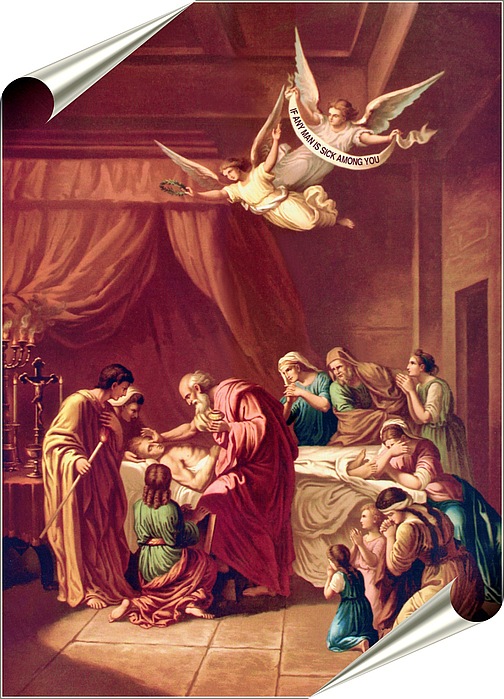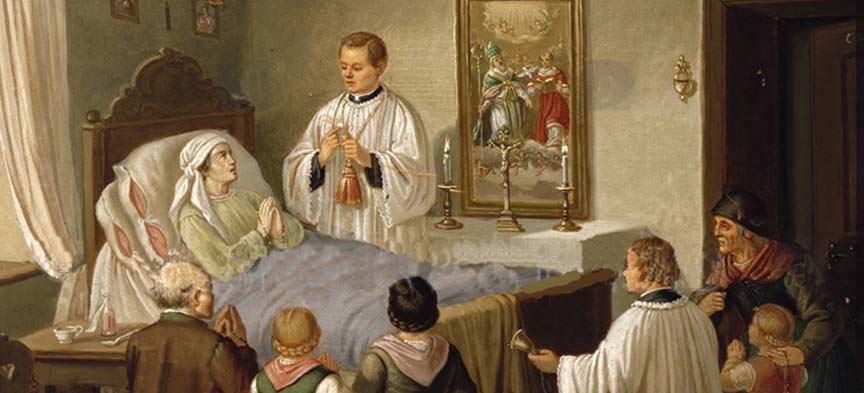 A. The Divine institution of the Sacrament of Extreme Unction may be proved from different sources.
A. The Divine institution of the Sacrament of Extreme Unction may be proved from different sources. A. The Divine institution of the Sacrament of Extreme Unction may be proved from different sources.
A. The Divine institution of the Sacrament of Extreme Unction may be proved from different sources.
Extreme Unction, so called because it is the last of those Rites of the Church in which unction (Holy Oil) is
employed, is a Sacrament in which the sick in danger of death – by the anointing with Holy Oil and the prayer of the priest – receive
the grace of God for the benefit of their souls, and sometimes also for the health of the body. The proximate matter of the
Sacrament of Extreme Unction is the anointing of the sick person (generally of the organs of the five senses) with Holy Oil;
the remote matter is the Holy Oil (Oleum Infirmorum) itself – olive oil, according to the Rite of the Latin Church,
blessed by the Bishop. The form consists of the accompanying words, which are as follows (English translation): By this
holy unction, and by His most bountiful mercy, may God pardon thee whatever thou hast sinned by sight, hearing, etc.
(Council of Florence, decret. pro Armen.)
That Extreme Unction is of divine institution follows (a) from the words of St. James : Is any man
sick among you? Let him call in the priests of the Church, and let them pray over him, anointing him with oil in the name of the Lord;
and the prayer of faith shall save the sick man, and the Lord shall raise him up; and if he be in sins they shall be forgiven him
(James 5: 14-15). The forgiveness of sins which is promised in virtue of this Rite could be attached to an outward sign only
by God; whilst the general precept of the Apostle to anoint the sick points to a permanent institution. (b) Tradition
testifies in various ways to the divine institution of Extreme Unction. St. Chrysostom (de sacerd. III 6) speaks of Extreme
Unction, together with Baptism and Penance, as a means of obtaining remission of sins; and Pope Innocent I (402-407) calls it a
sacrament. It is mentioned in several synods, and is numbered among the Seven Sacraments by the Greeks and Oriental sects.
(c) The Council of Trent (Sess. 14 de sacram. extrem. unct. can. 1) defines the Church's doctrine in these words:
If any one assert that Extreme Unction is not really and truly a Sacrament instituted by Christ Our Lord, and described by
St. James the Apostle, but that it is only a rite adopted by the fathers, or a human invention: let him be anathema.
The anointing of the sick by the disciples before the death of Our Lord (Mark 6: 13) is not to be considered as a sacrament, since it was evidently administered only for the health of the body. It may, however, be considered in some respect a figure of the sacramental unction which was to be instituted.
B. The special effects of Extreme Unction are four: (1) the remission of venial sins; (2) the removal of the remnants of sin; (3) fortitude in sufferings and temptations; and (4) not seldom the restoration of health.
Besides the increase of sanctifying grace, an effect common to all the Sacraments of the living, Extreme Unction –
1. Remits venial sins. By the sins mentioned by St. James we are to understand chiefly venial sins, as mortal sins are remitted through the Sacraments of Baptism and Penance – the Sacraments of the dead. Extreme Unction, however, can also remit mortal sin when it is impossible for one otherwise rightly disposed to receive the Sacrament of Penance; for in such a contingency there is no reason why the words of the Apostle, being universal, should not be verified. (This sometimes happens when a dying person begins to lose memory and forgets a mortal sin committed after the last good confession. If that person receives Extreme Unction with at least imperfect contrition, the Sacrament will remit the mortal sin. It must still be confessed, however, should the person remember it later.)
2. Another effect of Extreme Unction is the removal of the remnants of sin. By the remnants of sin are to be understood the effects which sin leaves in the soul after it has been remitted; such as temporal punishment, weakness of the will, depraved inclination, etc. The matter of the Sacrament signifies these effects, for a healing power is commonly ascribed to unction.
3. A further effect is fortitude in sufferings and temptations as signified by the matter, and especially by the
words of the Apostle: The Lord shall raise him up,
that is, give him strength to bear up against sufferings and temptations.
The consciousness of receiving in thisSacrament the treasures of divine mercy gives comfort and strength to the soul of the sick person.
4. Finally, health of the body is often an effect of Extreme Unction (Council of Trent, Sess. 14, de extrem.
unct. c. 2). The prayer of faith shall save the sick man.
But though the restoration of health is part of the virtue
which belongs to the Sacrament (ex opere operato), yet it is a secondary and subordinate effect, which takes place only when
it tends towards the chief object – the health of the soul.

C. The minister of Extreme Unction must have the priestly character; the subject is any baptized person who has attained to the use of reason and is dangerously ill – i.e., in danger of death.
1. Priests are exclusively the ministers of Extreme Unction. For the elders (presbyters) of whom the Apostle St. James speaks cannot mean elders in age, but those who have received the priestly character and are the dispensers of the mysteries of God. Moreover, Extreme Unction is, as it were, a supplement to the Sacrament of Penance; and, consequently, its administration must be entrusted to those only who have the power to administer this Sacrament.
2. Any Christian who has attained to the use of reason and is in danger of death by sickness may validly receive Extreme Unction. The forgiveness of sins of which St. James speaks supposes the use of reason, the power to distinguish right from wrong. The person who receives Extreme Unction must be in danger of death by sickness (for it is of the sick that the Apostle speaks), not by any probable or certain proximity of death from an external cause (e.g., execution, warfare). From the end for which the Sacrament of Extreme Unction has been instituted it follows that a less serious illness (without danger of death) is not a sufficient cause to receive it. For, its object is to strengthen us for our last agony, to cancel our sins and their effects, and thus to prepare us for our passage into eternity.
Extreme Unction being intended only for those who are in danger of death by sickness, its effects continue as long as the danger lasts. Hence it cannot be received more than once during the same illness. But it may be repeated if a new danger of death from sickness should set in, after the first has been overcome.
Alphabetical Index; Calendar List of Saints
Contact us: smr@salvemariaregina.info
Visit also: www.marienfried.com